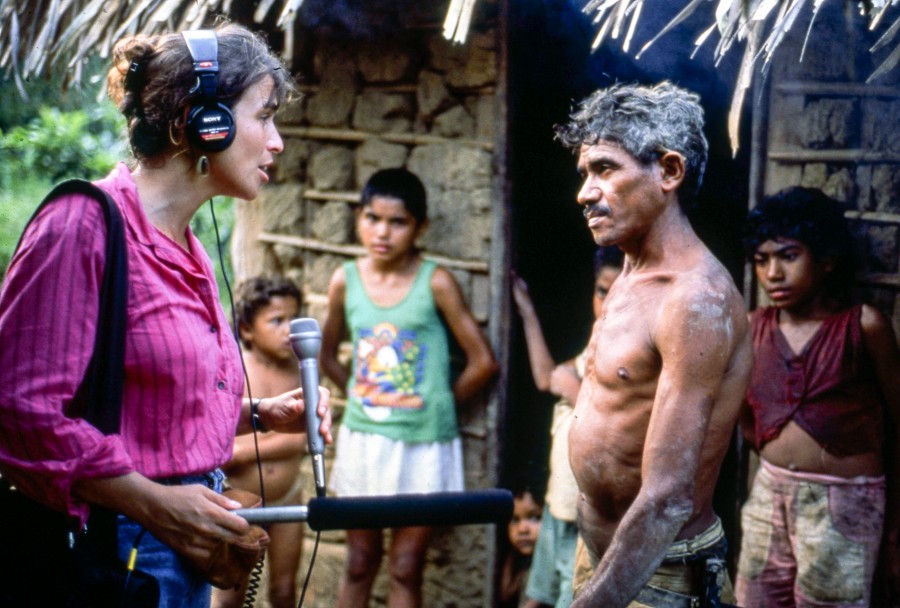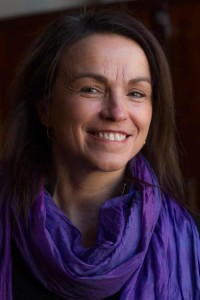
Family, friends, colleagues, and students gathered to celebrate the life and work of Cecilia Vaisman at the Medill School of Journalism at Northwestern University on January 25, 2016. You can watch a video of the event here. Below are the remarks of Sandy Tolan, Ceci’s partner in Homelands Productions.
My first memory of Cecilia Vaisman is outside NPR, the old M Street Shop, maybe 30 years ago. I was an independent radio producer living in Arizona, come to harangue editors.
Cecilia was working for All Things Considered then, just before she went to work with Weekend Edition, with Scott Simon. Anyway, we were heading with some others for a beer on the corner, two young reporters flush with the excitement of journalistic possibility. And getting RIGHT into it.
I don’t remember exactly what we talked about – maybe the trial of the church workers smuggling Salvadorans into the country, which I was working on. “That sounds GREAT, Sandy. That sounds super-interesting. That sounds AMAZING.”
Her passionate enthusiasm, her unwavering support, from day one. And maybe she talked about the street kids she had met in Rio while on assignment for NPR – her ability to open up her whole self and BECOME them. Part of her astonishing ability to transform herself, to enter someone else’s experience. As we walked toward the corner bar on 20th and M, little did I know such a deep collaboration, fellowship, friendship, kinship – witness to each other’s lives – would follow.
Soon Cecilia would join me, Nancy Postero, and Alan Weisman in a vast enterprise known as Vanishing Homelands – seven hours of documentaries, 400 hours of tape, 14 countries. In August 1990 we headed south from Tucson to Costa Rica. We drove two trucks filled with clothes, files, cassette tapes, and a few Sony TC-D5M stereo cassette recorders. With Dolby! And later Cecilia was present at the creation of Homelands Productions. And I’m here representing Homelands along with Alan, and our leader Jon Miller, and fellow Homelanders Ruxandra Guidi and Bear Guerra, now based in Ecuador.

Of course there’s a lot to say about Cecilia’s tremendous creative gifts, and her remarkable ability, as Alan says, “to set current events to music.” It’s no coincidence that Cecilia played the bass. She even enlisted two Latin American musician friends to compose and perform the theme music for Vanishing Homelands.
But despite possessing these gifts in spades, Cecilia rarely allowed any of that to obscure her appreciation for silliness, her humane appreciation for the absurd, for playfulness in the midst of the most intense kind of work. Her ability to keep it real, and fun.
There was a sloth. A sloth living in a tree in Costa Rica, at some forest resort where we Homelanders had convened for an IMPORTANT PRODUCTION MEETING. Everything was VERY IMPORTANT in those days. Everything was EXTREMELY IMPORTANT. We had to assess our production schedule, plan our next trips into the bush, check in with our editor back in Washington – Pat Flynn, who’s here today.
But Cecilia was drawn to the sloth. And then my attention was drawn to the sloth. Because I don’t know if you’ve ever seen a sloth, but this one had a little smile on its face, and it moved… very… slowly. With its… two… fingers. I’m going to go way… over… my time… if I keep this up. That thing must have moved two feet in an hour, I’m not kidding.
But what I remember is Cecilia’s understanding of the absurd juxtaposition of the VERY IMPORTANT MEETING of these rainforest journalists on the loose… with… the… sloth. So for the whole weekend Cec and I were meeting like this (two fingers), and Ceci with that laughter where she had to catch her breath – Ana has that – to the mild annoyance of our more serious colleagues.
Down in Costa Rica, Cecilia used to lead us, now and again, in the salute to the sun. I wasn’t down with this yoga thing back then. But it was her wisdom at work: back these guys off from all this intensity! SALUTE TO THE SUN.
And then a year later, back in Arizona, Prescott, near the end of Vanishing Homelands, we had decided to try to keep our little journalist collective together. But what to name ourselves? I remember Ceci standing at a whiteboard in our basement studio in Prescott, drawing up little figures alongside our various proposed names.
Next to “Boxcar Productions” she drew a little Depression-era tramp, maybe with one of those sticks with the clothes in a bundle. Finally after a very long list of ideas – “How about The People’s Productions? How about Righteous Truth Productions? HEY, how about just THE TRUTH productions!? – Shining Light in the Shadows Productions?!?!!” – we came up with something we liked. Lost Voices Productions!
Think about that, folks. This is for a radio production company. A friend pointed out that it sounded like we all had laryngitis. So we dropped the Vanishing and settled on Homelands. I remember Cecilia’s delight in the hilarity of all of that, her ability to see the absurd inside the serious.
So many of the stories we’ve been sharing in these days center around Cecilia’s effervescence. Her incredible life force. Her AMAZING ability to connect, support, ENTHUSE – “That’s just great, Sand, that sounds AMAZING…”
When someone so powerfully infused with life force, so humane, when such a beautiful person leaves you so too early – it is hard to make sense of it. There’s a question of fairness. This isn’t fair. This. Isn’t. Fair.
When my own father died at 49 when I was 18, I remember my anger at the unfairness of it all, and the confusion, trying to understand how such a life force left us so early. And at the memorial and celebration of his life, at our house in Milwaukee, on that cold February day in 1974, I remember a complete stranger walking up to me and offering me some unsolicited insight, which at the time I didn’t appreciate, wasn’t ready to hear. But I’ve thought of it more than a thousand times since then.
She said, as I stared at the floor, “You know, when someone you love dies, there is a giant hole. A hole so big you can’t move. You can’t take a single step. And then after a little while, the hole shrinks a little bit, and you can begin to at least walk around the hole. And then it shrinks a little bit, and a little bit more, and a little bit more. But it never goes away. That hole is with you for your life.”
And that is not all bad. Because we have example. We have inspiration. In our case, here today, we have not only Cecilia’s compassion, enthusiasm, her life force, her playfulness, her humor, her generosity, to give and give and give, with every last ounce of her strength. Cecilia leaves us with so much inspiration. So many things from her that we can choose to aspire to in ourselves. And one more of those things is kindness.
I want to close with a few lines from “Kindness,” a poem by Naomi Shihab Nye.
Before you know kindness as the deepest thing inside,
you must know sorrow as the other deepest thing.
You must wake up with sorrow.
You must speak to it till your voice
catches the thread of all sorrows
and you see the size of the cloth.
Then it is only kindness that makes sense anymore,
only kindness that ties your shoes
and sends you out into the day to mail letters and
purchase bread,
only kindness that raises its head
from the crowd of the world to say
it is I you have been looking for,
and then goes with you every where
like a shadow or a friend.